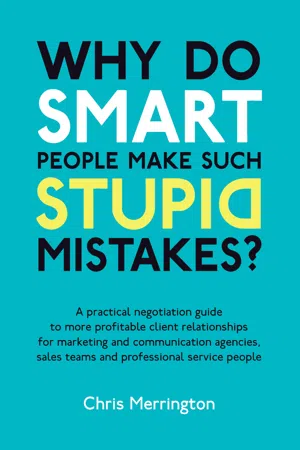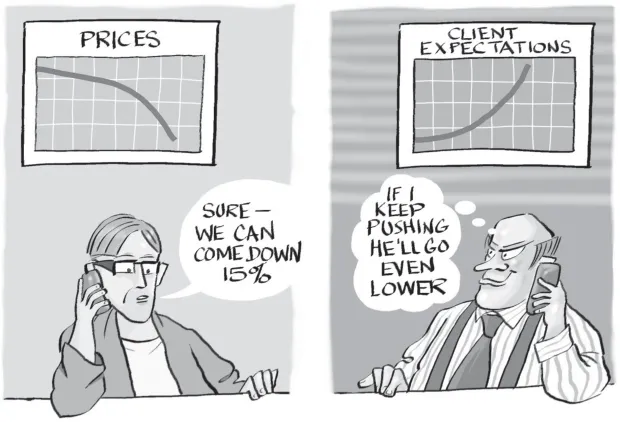![]()
CHAPTER 1
Why do smart people make such stupid mistakes?
Key points in this chapter
• Heightened awareness of the mistakes we can so easily make when negotiating with clients
• The opportunity to reflect on which of the mistakes are ones you are making and need to avoid
Let’s look at the typical mistakes people, including smart people, make when selling and negotiating in the service industry and agencies especially. Then, in the other chapters of the book, we will consider how best to avoid and learn from these mistakes.
It’s not dumb to make a mistake. If you never make mistakes you are probably not taking enough risks and aren’t pushing yourself enough. However, what is really dumb is to repeat the same mistake over and over again. It’s dumb not to learn from our mistakes. It’s dumb not to observe, reflect, think and change your behaviour when you can see a particular action or strategy isn’t working well. So why do we find it so hard to learn from our ‘negotiation’ mistakes?
I’ve worked with many really smart people within agencies and in sales teams of many leading companies. However, I see the same mistakes being made in most of those companies, often over and over again. These smart people are generally making quite good money from their clients; however, they could be making so much more. Much of this book is common sense, yet it often isn’t common practice.
Here are the typical mistakes smart people make. In the rest of the book we will discover what the best practice techniques and strategies should be to avoid these mistakes.
Mistake 1: Price crumbling
How well do you hold your prices?
Clients and customers will challenge your price; it’s part of their job to do so. However, price crumbling too quickly will cost you dearly. The more you drop your price and the quicker you drop your price, the more the client will expect you to drop your price even further. Clients will see your willingness to drop your price, not as generosity, but that your original price was over-inflated or had so much fat built in that you could easily afford to lose some of it.
Does this mean you should never drop your price? Of course not, there are specific strategies to apply if you do need to drop your price. Even dropping your price by as little as 1% or 2% can have a major impact on your overall bottom line profitability.
Imagine you are looking to buy a new house or flat. You go to see one priced at £300,000 which you like and decide to put in an offer. You decide to put in an aggressive offer of £250,000 expecting it to be refused. Instead the vendor enthusiastically says ‘OK.’ Instead of feeling delighted, you are now thinking you should have gone even lower and that maybe something is wrong with the property as the vendor seems so desperate to sell. The relationship and trust between buyer and seller is not looking good.
Yet how often do we do something similar for clients, agreeing to provide essentially the same proposal but matching their lower budget rather than our original proposed higher price?
During the recession, agencies told me their clients had threatened them that they had to reduce their fees by 20%, 30%, 40% and even 50%. If you are over-dependent on that client, you are left with little alternative but to comply.
Most people price crumble – often in the belief that they will lose the deal unless they drop their price. Whether it is from desperation or in order to show the client how keen we are to work with them, we often drop our price. The paradox is that the more we drop our price, the more the client wants us to drop our price still further. So will we lose a deal if we don’t drop our price? Maybe, maybe not. Dropping our price too easily creates mistrust and can seriously damage the relationship rather than strengthen it. If you don’t believe in the value you provide, then why should anyone else?
General Motors instructed all their agencies in the US in 2008 that their fees would be reduced by 20% due to poor sales in the automotive industry. How would you respond if your client demanded that of your agency? (A 20% drop in the revenue from this client will impact your profitability significantly more than 20%.) For many companies which make less than 20% profit this may mean losing money.
Is this the ultimate in price crumbling? (Self-imposed)
One agency was so desperate to win an important new high-profile client (having lost several major clients in a short period) they offered to charge no fees to this new client for the first year. At the end of the twelve months the plan was that the agency’s fees would revert to their proposed normal level. Presumably they felt this would be a yearlong opportunity to demonstrate how good the agency was and that the client would be so impressed they would hire them at the normal level of fee at the end of Year One. What do you think happened at the end of the year?
The client left and went to another agency.
When we give things away for free there is a danger that clients see the value as just that – free or zero.
When we come up against a tough negotiator who may use aggression, a tough negotiation stance and even threatening behaviour, it is so easy just to give in to their demands and drop our price. Subsequently, most of us regret that decision.
Decide in haste, repent at leisure.
Mistake 2: Lack of preparation
It is common to skip preparation before negotiation meetings and phone calls believing you can ‘wing it’ in the meeting – or worse still, on the phone.
Often it seems the more senior the person in the agency, or sales person, the more they think they can ‘wing it.’
This can be exacerbated when two or more of you go to a negotiation meeting with clients and haven’t prepared. You are likely to contradict each other.
There are few areas in life where preparation pays off more than in negotiations.
It will increase your confidence to negotiate, provide goals to aim for and help you anticipate possible actions, questions and challenges by the other party.
Mistake 3: Thinking great ‘client service’ is always saying ‘yes’
What is the impact on your business of always doing your client’s bidding and always giving them what they want?
When we join an agency in a junior role, typically we are told how important the big clients are and that ‘whatever it takes’ is the mantra.
Giving in ‘for an easy life’ is so common; however…
You get the behaviour you tolerate.
It is easy to make the mistake of doing what you think is right in the short term. However, you end up making life harder for yourself in the medium and long term.
Clients encourage this mistake. They want more for less. They seize every opportunity to squeeze more from each budget.
Sometimes, weak agency account management believes, incorrectly, that the way to retain clients is to do everything and anything clients want, even for an unprofitable fee. Great client management should really be about delivering value by the bucket-load at a fair price and a fair return for the agency.
Charge what you are worth not what you think they will pay.
Managing the expectations of your client is an important skill. Sometimes we over-promise through excitement, enthusiasm or naivety, or all three, and then either under-deliver – or worse, fail to deliver.
Giving in for an easy life has become a huge problem for agencies. Agencies are haemorrhaging profits by being too quick to say ‘yes’.
Many account handlers are too passive and too reactive towards their clients. If you lack assertiveness in your negotiations, there is a high risk the other party will take advantage of your behaviour or, if nothing else, that you don’t achieve the full potential of the deal for yourself.
Often this lack of assertiveness is combined with weak agency account management. We agree too readily to a client’s demands from the fear of ‘rocking the boat.’ We don’t charge for those ‘minor changes’ or the fourth set of amends. We don’t question that unreasonable deadline or inadequate budget versus the client’s requirements.
What happens when you give a child everything it wants, such as a new computer game, a new mobile phone, sweets, DVDs, fast food and always say ‘yes’ to their demands? In workshops when I ask this question I get the answer ‘a monster’ or ‘a brat.’
Are there parallels with agency clients? By caving in and giving your client everything they demand, what might you turn your client into?
Excitedly, we win that new client after a gruelling pitch against tough opposition. We win that new client having impressed them with our strategic thinking, our insights into their business, our reputation, our creative ideas, our challenging perspective and our new-found business relationship.
We’ve developed and presented some of our best thinking and ideas. Our great fresh thinking impresses the client and they are convinced they are about to employ experts who really understand the client’s business.
Then, perhaps two years later, there is a danger we become like a sau...

